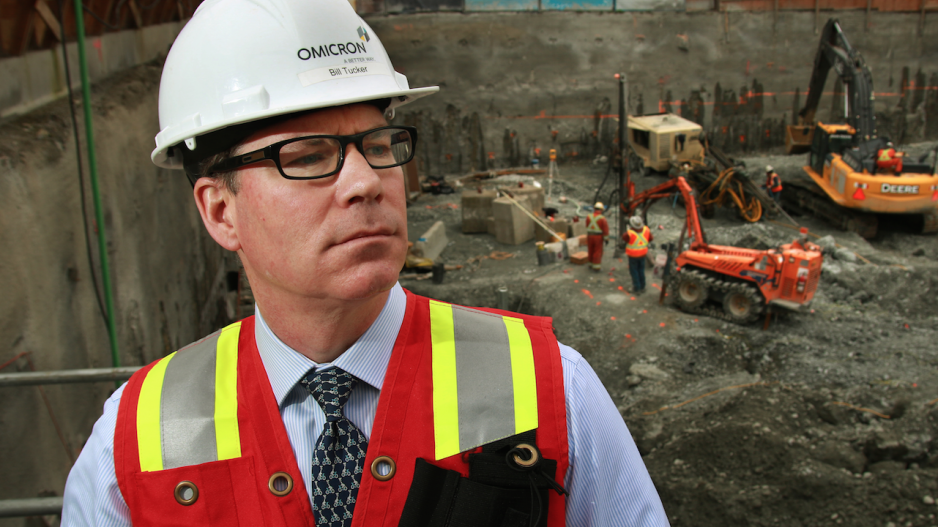With cases of the COVID-19 variant Omicron spreading rapidly around the world, interest in the easily transmissible disease is intense.
Curiosity about the variant was so strong, for example, that Vancouver’s 23-year-old design, construction and development firm Omicron saw a 1,000% spike in its web traffic in the days following the variant’s discovery.
“It’s really unfortunate that Omicron has been labelled as the name of the new variant,” Omicron CEO Bill Tucker told BIV. “COVID-19 is a terrible thing that’s ravaging our world.”
Tucker said the company has no plans to change its name.
He said he doubts that his company will gain business from the newfound attention, but he also doubts that Omicron will lose future business if it keeps its name.
His company’s projects are often in the $40 million range, and Tucker said his clients tend to go through an involved trust-building process before they award their business to Omicron. In that process, they meet the executive team and assess the firm’s reputation, past performance and effectiveness at performing jobs.
“The Omicron name is our name, and the customers we work with know what it’s associated with,” Tucker said.
Public attention toward the name Omicron may heighten awareness of Nexii, which acquired Omicron as a wholly owned subsidiary in July.
In addition to buying Omicron, and having former Vancouver mayor Gregor Robertson as a senior vice-president, Nexii is known for manufacturing environmentally sustainable, low-carbon building materials.
Sometimes, organizations are quick to rebrand when an unexpected event creates negative associations with the name of a company or product.
The ISIS Research Centre at the University of British Columbia’s Sauder School of Business, for example, deftly changed its name in 2014 to the Centre for Social Innovation & Impact Investing.
Executive director James Tansey told BIV that because that new name is a “mouthful” most people condense it to SauderS3i.
Few were likely to link the research institute with the then-emergent radical Islamic terrorist group ISIS, which was committing atrocities in Syria and Iraq.
Still, the Sauder School of Business’ dean, Robert Helsley, in 2014 told Tansey that the centre’s name had to change, Tansey said.
No consultants were brought in to stickhandle the rebranding in part because the university had its own internal process for naming centres, Tansey said.
Branding expert and Brandever Strategy principal Bernie Hadley-Beauregard told BIV that the real estate developer Omicron is probably wise, at least in the short term, to resist a knee-jerk decision to change its corporate name.
“Many cringed at the news of Delta Airlines Inc. (NYSE:DAL) having the same name as the COVID-19 Delta variant earlier this year,” Beauregard said.
“In the heat of the moment, it seemed as if Delta Airlines had no other choice but to immediately change names. In retrospect, however, the variants have moved on, and now, no one has a second thought about Delta Airlines having maintained their corporate moniker.”
The Corona beer brand, similarly, endured ridicule on social media, with some joking about the Corona beer virus, and others spreading misinformation that the beer company was somehow responsible for the virus.
Its sales, however, soared during the pandemic.
Constellation Brands Inc. (NYSE:STZ), which owns Corona’s U.S. rights, saw sales for its Corona and Modelo beers in the U.S. rise 10% in the 12 months that ended in February.
“Renaming initiatives are surprisingly time-consuming and costly for organizations to implement,” Beauregard said.
“The process spans well beyond the initial name generation exercise, which often takes six or more weeks to perform, in a best-case scenario.”
He said that rebranding campaigns consult stakeholders to aid in decision making and include consumer research, copyright and trademark registration and the new brand’s rollout – including logo design, signage, packaging, fleet livery, advertising and communications among other elements.
“It is realistic for name changes to take six months or even a year to fully activate,” he said. “Current transportation and manufacturing challenges add even more time delays and expenses to the decision matrix.”
Sales can suffer if a wary public associates a new disease with an established product’s brand.
Makers of the diet candy Ayds, in February 1986, said that Acquired Immune Deficiency Syndrome (AIDS) would not prompt them to change the name of their product.
“The product has been around for 45 years,” marketer Jeffrey Martin Inc. executive vice-president Frank DiPrima told Advertising Age on February 4, 1986. “Let the disease change its name.”
Rights to the Ayds brand were then sold to Dep Corp., and on March 4, 1988, the New York Times reported Dep Corp. chairman Robert Berglass saying that his company had seen a 50% drop in Ayds candy sales “because of the name association [with AIDS].”
Dep then discontinued the Ayds brand.
Beauregard’s final advice for yet-unnamed companies turning to the Greek alphabet for inspiration is to consider letters closer to the end of the alphabet to avoid any potential unpleasant surprise.
Omega is the 24th and last letter in the Greek alphabet.
Although it is unclear if an Omega variant will emerge, a Swiss company, now a subsidiary of The Swatch Group (SWX:UHR), has marketed the Omega watch brand for 118 years, and it changed its name to Omega in 1982. Omega has built its luxury brand through the decades with Olympic sponsorships and appearances in James Bond movies.




